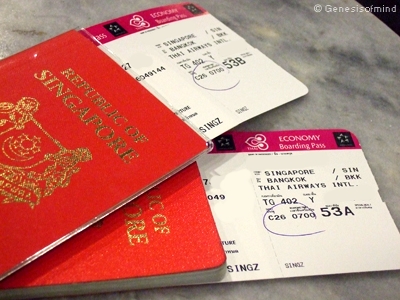If you have an opportunity to change your citizenship to Singaporean, would you do it? Here, Adit shares some points that you might want to consider before making your decision.
Intro – That compulsory question from your seniors
On October 25th, 2017, Singapore becomes the country with the most powerful passport in the world. Due to its attractive benefits of staying in Singapore, becoming a Singapore citizen is inside one of every foreign student of a Singapore Local University wish list to be crossed out sooner or later. Most of my seniors who went for NTU/NUS before 2011 have their SPRs (Singapore Permanent Residents). Back then, they were given letters from Singapore government, which intend to invite them to apply for SPR upon getting a job offer here. Moreover, SPRs can also bring aged parents (no economic value) and easier the process for them to apply for the SPR.
After 2011, the public backlash over the lax migration policy resulted in a political price for the government of the day, which led to the infamous “watershed” election results. Immigration policies were instantly tightened, and applications easily took 8 months to a year. But after 2015, while still a political issue, their stance has become more nuanced. Those that fit the profiles needed by Singapore gets through (at least 6 months).
I came to Singapore in 2015, and it never crossed my mind to have a Singapore PR because I long to build a family in Indonesia and to have a business that can impact millions of Indonesian nationwide. But the first time I stepped myself into the Singapore, my senior told me: “Are you nuts? Becoming a Singaporean is a must and SPR is the holy grail!”
Three years went by and I just keep myself away from that question. But one day, I sat by myself and think, “Is giving up your Indonesian citizenship actually benefit you after all?”
This article is a compilation of my thoughts and the general facts after a long research on Singapore and after a few conversations with my peers and seniors who went through peaks and falls of living in Singapore. I thought that it would be great to share it with all of you aspiring Singapore Diasporas who long to become a Singaporean as well.
You will be very privileged to be a Singaporean (perks)
Singapore has a lot to offer in terms of citizenship (and to some extent, permanent residents) benefits. In a more general term, it is one of the safest cities in the world, the most upbeat across Southeast Asia, and if you’re from crazy Jakarta, the traffic jams here are way more manageable. Singapore passport goes to most places around the world without a pre-arranged visa needed because the country has good political relations worldwide. Slightly better chances of migration to other countries (if you’re thinking of this).
In terms of general welfare, Singapore has a CPF (central provident fund) which is an employment-based savings scheme with employers and employees contributing a mandated amount to the Fund. It is a compulsory comprehensive savings plan for working Singaporeans and permanent residents that come in handy when you are planning to fund your retirement, healthcare, and housing needs.
Moreover, Singapore has a top-notch public education system, fantastically low crime stats. It is peaceful, a unique blend of cultures. And the food? Plenty of them.
It’s not all rainbow and roses
But all this has come at a heavy price of exclusion and oversimplification in my opinion. Singaporeans are grouped into just four racial categories and are issued identifications mark from the government, similar to Indonesia back then 1960s. Worldwide freedom house scores are just 4 out of 7 for political freedom and civil liberties, education starting from primary school is horrifyingly competitive and stressful, and in terms of the worldwide rat race, we’re the third most competitive in the world.
Here’s how you can apply
The Ministry of Manpower (MOM) website explains the details regarding the application in great detail:
https://www.ica.gov.sg/PR/citizenship/PR_citizenship_becomeasc
https://www.ica.gov.sg/pass/PR/pass_PR_becomeapr
From the information gathered from the website, there are a few paths to citizenship. But the most likely path is that: first come to work in Singapore on a sponsored Employment past, then apply for Permanent Residency (PR) after years of working. Rinse and repeat for a while then apply for citizenship.
The Singapore government has slowed down immigration to let the economy and infrastructure influx catching up with the tide. Once this is settled, the immigration process is anticipated to be gradually loosened to ensure that the labor needs of businesses are met and Singapore remains as a business-friendly as possible. This would mean that the number of Employment Passes (EP) and S Passes will rise as well as the number of successful Permanent Residence (PR) applications. This is so as the common way of gaining citizenship is through the PR route.
Singapore does not allow Dual Citizenship – If you decide to become a Singapore citizen you will have to renounce citizenship of your home country and give up your home country passport. This is perhaps the biggest disadvantage of acquiring Singapore Citizenship. Furthermore, you will be a little bit burdensome in the future. Your CPF account has its withdrawal limitation – If you wish to withdraw all your CPF savings as a lump sum, the only option is to renounce your citizenship status. This rule holds good for Permanent Residents as well.
While the PR numbers are kept to 530,000, each year, there are a good number of existing PR holders who renounced/lapsed their PR statuses for various reasons. This is one of the reasons why approvals are still stable at about 30,000 each year for the past 3 years although criteria for successful applications have been more stringent. Thus, the opportunity for successful PR applications are still high but applicants will need more guidance to present a strong application package.

Indonesia is home for some, heaven for many
If you are thinking of retiring in Indonesia, please do not think about becoming a Singapore citizen. There is a clause in the Indonesian law stating that Indonesian who gave up their citizenship may not get their Indonesian citizenship back (or at least, it will be very difficult). Limited land and company ownership. Foreigners cannot own land. Their ownership of companies ranges from certain banned industries (no ownership) to between 20% to 95% (for some industries) to 100% (for some industries).
Inflation will catch up with Singapore wages, so forget that dream of retiring in Singapore while sipping apple martinis and giving yourself a tan. Singaporeans will have to work till we’re 67, or even longer. And if you are an aspiring entrepreneur, Singapore is a very limited market. Indonesia, the most populous nation in the SEA, is a huge market, compared to Singapore’s tiny 5 million one.
In contrast to Singaporeans, Indonesian people (in general) are warm, friendly, and willing to help others. Indonesian have a very special bond between each other and especially if you lump Indonesians abroad (this is through my observation of Indonesian student association worldwide).
Lastly, you’ll miss the food! Looking back to my childhood, I was raised with all the amazing, flavorful food and with a culture that I can feel proud of (although I often take it for granted). It’s a different feeling that you can’t get anywhere else abroad (and that’s the reasons why we see so many expats right?).
What do you need to consider?
Citizenship is an important decision for any person. It is not a privilege, but a responsibility. I found a good thread on Quora advising on things to consider before you apply for a certain country’s citizenship. Before applying for citizenship, consider the following questions:
• Are you willing to contribute to the good of the country?
• Are you willing to sacrifice time and effort to understand the issues concerning the country and what would be in the best-interest for your fellow citizens?
• Are you willing to speak out when you see the country or its citizens in danger?
• Are you willing to understand the culture of the country and integrate with the rest of the population?
Citizenship is a declaration that you will play a role in the country’s future. It is neither a responsibility nor a decision to be taken lightly.
Conclusion – there’s no such question as “which citizenship is better”
It is a hard decision to choose which country to live in, and mind could not decide what the heart cannot. Although sometimes I wish I was born and raised in a well-developed country, being an Indonesian (most of the times) also feels like a blessing to me.
Some people might think that Indonesian citizenship is better than Singapore and vice versa, but at the end of the day, it’s your choice to apply for SG citizenship, nobody will take that away from you– even though that there are plentiful narrow-minded Singaporeans who dislike foreigners applying for SG citizenship and there are tonnes of overly-patriotic short minded Indonesians. Ignore those people and bravely make your decision!










Interesting perspective! I was skeptical at the first time. But, you gave me some insights which people should know about. Getting citizenship isn’t just about the privilege, but also gaining the responsibility. Nice!